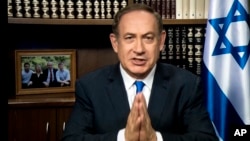Israel's politics are darkening: the governing coalition, in power for barely two years, is in tumult and regional tensions are rising.
Looking only at the economy, things seem bright. U.S. chip giant Intel recently bought local start-up Mobileye for $15 billion, growth is robust and the currency is at record highs.
But beyond the boom, speculation of early elections is rife, friction with Gaza's Hamas rulers is intensifying and Israeli air strikes on Hezbollah fighters in Syria have provoked anti-aircraft missiles in response from Damascus government forces.
To an extent, Israel is always juggling economics and politics. In the past it has sustained growth and foreign investment despite electoral uncertainty and bouts of conflict, whether with Hamas or with Hezbollah on the Shi'ite movement's Lebanese home turf.
The difference now is how rapidly the picture has changed and how close it may be getting to shifting out of control, even if neither Israel nor Hamas nor Hezbollah seeks war.
A month ago, Prime Minister Benjamin Netanyahu's right-wing coalition appeared solid. Despite being a suspect in two criminal investigations, "Bibi" was set to eclipse David Ben-Gurion's record to become Israel's longest-serving leader.
But in the past few weeks Netanyahu has picked a fight with his finance minister - they disagree over the creation of a new public broadcaster - exposing wider discontent in the coalition and prompting active talk that he might seek an election two years ahead of schedule.
At the same time, tension with Hamas has surged, especially after the assassination of one of its high-profile militants last week, a death blamed on Israel. The air strikes targeting Hezbollah forces fighting in support of the Syrian government prompted Damascus to fire Russian-supplied surface-to-air missiles at Israeli jets, ratcheting up regional anxiety.
Chagai Tzuriel, director general of Israel's ministry of intelligence, said economic hardship in Gaza was fueling social and political problems and making the situation unpredictable.
"Hamas is the greatest non-state threat in terms of volatility," he said, while describing Hezbollah's military capability - it is estimated to have 100,000 rockets that can target Israel - as more worrying overall.
War in Lebanon?
While the chatter about early elections may be overdone - none of Netanyahu's coalition partners wants new polls and he may be exploiting that concern to keep potential disruptors in line - the regional risks are harder to control.
Hamas appointed a new leader in Gaza last month, Yehya Sinwar, who spent 20 years in an Israeli jail and is close to the movement's military wing. Since then, analysts have worried about the risk of another war after three major conflicts in the territory since Hamas seized power in 2007.
Those fears deepened last Friday when Mazen Fuqaha, a militant released by Israel in a 2011 prisoner swap and exiled to Gaza, was shot and killed, apparently by killers using silencers.
Hamas immediately blamed Israel, despite questions about how it would have carried out the killing and why. An Israeli army spokeswoman declined to comment.
Before Fuqaha's death, Hamas kept tensions in check, making sure its militants tested rockets by firing them into the sea, and tracking down rival groups that fire into Israel. Israel too largely kept to script, retaliating to rockets with air strikes that usually targeted empty Hamas buildings.
That may change, depending on the fallout from Fuqaha.
"If war begins, battles will be tougher with Sinwar at the top," said Gaza political analyst Akram Attalah. "The situation is on the edge of collapse. Hamas and Israel are in a dilemma over how things can proceed."
If Gaza is unpredictable, Hezbollah may be more so.
In 2006, when Israel and Hezbollah last fought a war, the conflict began after shelling over the country's border with Lebanon and an ambush in which Hezbollah militants killed three Israeli soldiers and seized two others. The month-long conflict
killed 1,400 people and caused a mass upheaval of populations.
A decade on, with the war in Syria allowing Hezbollah freer rein to encroach towards Israeli-occupied territory on the Golan Heights, the risk of an unforeseen escalation is constant.
Israel has carried out air strikes on Hezbollah units in the area, saying it wants to prevent advanced weaponry from reaching the group, which is backed by Iran. From its side, Hezbollah denounces Israel's actions with strong rhetoric.
Naftali Bennett, a right-wing member of Netanyahu's coalition and a potential challenger, sees another war with Hezbollah as a rising risk, one he hopes can be kept in check by warning Lebanon as a nation to beware.
"The Lebanese institutions, its infrastructure, airport, power stations, traffic junctions, Lebanese army bases – they should all be legitimate targets if a war breaks out," he told Haaretz newspaper this month.
"If we declare and market this message aggressively enough now, we might be able to prevent the next war. After all, we have no intention of attacking Lebanon."





